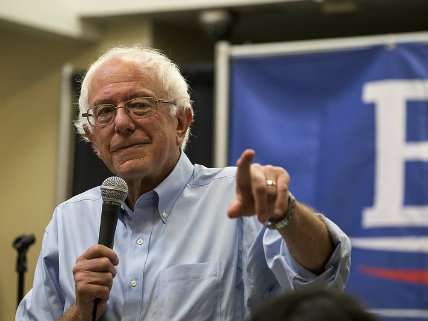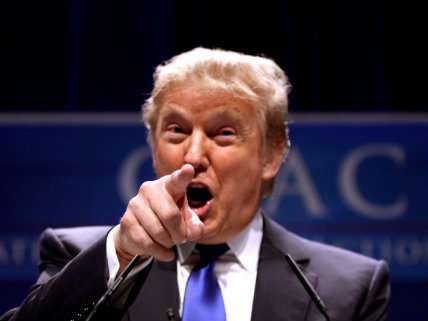Bernie Sanders and Donald Trump Are Both Peddling Myths About Money In Politics

One of the most effective moments in Bernie Sanders' lengthy speech following his primary victory in New Hampshire was his call for donations.
After a characteristic denunciation of tax breaks for billionaires and proposals to cut to social services funded by wealthy special interests, Sanders, who has made campaign finance reform a defining issue for his campaign and who has repeatedly described money in politics as a kind of rot at the heart of American democracy, declared himself to be independent of such financial influence.
"I do not have a Super PAC, and I do not want a Super PAC," he said, before touting both the record 3.7 million individual contributions his campaign has received so far and the average contribution amount of $27. And he urged people to go to his website and donate. "I'm going to hold a fundraiser right here, right now, across America," he said on national television. "My request is please go to BernieSanders.com and contribute. Please help us raise the funds we need, whether it's 10 bucks, 20 bucks, or 50 bucks. Help us raise the money we need to take the fight to Nevada, South Carolina and the states on Super Tuesday."
Sanders wasn't just asking for financial support, like politicians always ask for financial support. He was asking for people to participate in an alternative to the system to which his campaign stands opposed. He wasn't just saying he believed that special interest money in politics was a problem, he was showing them how he would solve it—and how his supporters, through the unification of their individual efforts, could become part of that solution.
It's a clever pitch, and apparently very effective too. His campaign claims to have processed 2,689 donations in a single minute at one point that evening, and raised $6 million by Wednesday evening.
The problem with this pitch, however, is that Bernie Sanders is not exactly free from the financial backing of interest groups either.
Although there is no explicit Bernie Sanders SuperPAC, The New York Times reported at the end of January that "more super PAC money has been spent so far in express support of Mr. Sanders than for either of his Democratic rivals, including Hillary Clinton, according to Federal Election Commission records." Much of that money comes from labor groups, in particular, the National Nurses Union, whose political division had spent more than half a million dollars on Sanders by last December, even while insisting that their support is distinct from big-money support by true SuperPACs.
It's not. Just as Citizens United, the Supreme Court decision that Sanders rails against in his speeches, gave corporations the right to spend money in support of candidates, it also gave the same right to labor groups. And they have used it. As The New York Times also noted, unions gave more than $200 million to super PACs in 2012 and 2014, more than half of which ended up in the hands of union-controlled groups that funded advertisements and other media.
Sanders' opposition to big money in politics, and his simultaneous quiet acceptance of labor backing, makes sense for a democratic socialist leading what amounts to a progressive-populist uprising within the Democratic party.

Clearly there is something powerful and compelling about the idea of financial independence for politicians, especially those who cast themselves as outsiders and revolutionaries, and just as clearly there is a broad suspicion about the influence of money in politics, and the ways it both influences and advantages political candidates.
What's especially interesting, though, is that Donald Trump is making a version of the same pitch too. Over and over again on the campaign trail, Trump has described his campaign as self-funded, and insisted that this means he cannot be bought.
The problem, of course, is that it's not really self-funded.
In October, The Washington Post revealed the existence of a pro-Trump Super PAC with multiple links to Trump and his campaign, though Trump's campaign claimed it was unsanctioned, and the PAC was quickly shut down. Either way, however, the majority of Trump's campaign is paid for by donations, and Trump is risking rather little of his own money in his presidential bid. Indeed, it's possible that sales of Trump merchandise may end up paying him back for the entirety of his personal investment in the race, according to The New York Times.
Yet it's also true that both Trump and Sanders are operating campaigns without the same sort of hefty quasi-institutional backing that has gone to more traditional establishment candidates like, say, Jeb Bush and Hillary Clinton. That complicates the Trump/Sanders message too. Because in that sense, the success of both Trump and Sanders is self-refuting—proof that big money in politics is not as powerful as they might have you believe.


Show Comments (92)